Related Research Articles

Nicholas Gregory Mankiw is an American macroeconomist who is currently the Robert M. Beren Professor of Economics at Harvard University. Mankiw is best known in academia for his work on New Keynesian economics.

Alice Mitchell Rivlin was an American economist and budget official. She served as the 16th vice chair of the Federal Reserve from 1996 to 1999. Before her appointment to the Federal Reserve,Rivlin was named director of the Office of Management and Budget in the Clinton administration from 1994 to 1996. Prior to that,she was instrumental in the establishment of the Congressional Budget Office and became its founding director from 1975 to 1983. A member of the Democratic Party,Rivlin was the first woman to hold either of those posts.

The Urban Institute is a Washington,D.C.–based think tank that conducts economic and social policy research to "open minds,shape decisions,and offer solutions". The institute receives funding from government contracts,foundations,and private donors. The Urban Institute measures policy effects,compares options,shows which stakeholders get the most and least,tests conventional wisdom,reveals trends,and makes costs,benefits,and risks explicit.
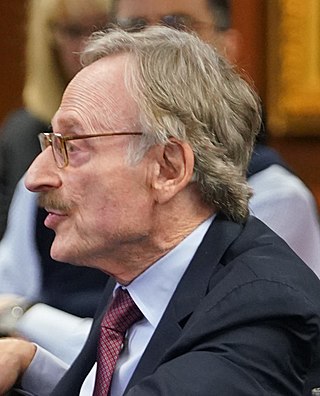
Michael Jay Boskin is the T. M. Friedman Professor of Economics and senior fellow at Stanford University's Hoover Institution. He also is chief executive officer and president of Boskin &Co.,an economic consulting company.
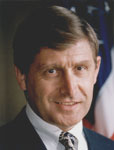
Martin Neil Baily is an economist at the Brookings Institution and formerly at the Peterson Institute. He is best known for his work on productivity and competitiveness and for his tenure as a cabinet member during the Clinton Administration. He was one of three members of the Council of Economic Advisers from 1994 to 1996,and chairman of the Council from 1999 to 2001. He currently co-chairs the Bipartisan Policy Center's Financial Regulatory Reform Initiative and serves as a senior advisor at Albright Stonebridge Group.
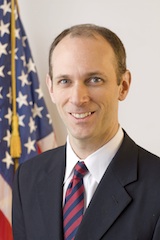
Austan Dean Goolsbee is an American economist and writer. He is the President of the Federal Reserve Bank of Chicago. Goolsbee formerly served as the Robert P. Gwinn Professor of Economics at the University of Chicago's Booth School of Business. He was the Chairman of the Council of Economic Advisers from 2010-2011 and a member of President Barack Obama's cabinet. He served as a member of the Chicago Board of Education from 2018–2019.

William Arthur Niskanen was an American economist. He was one of the architects of President Ronald Reagan's economic program and contributed to public choice theory. He was also a long-time chairman of the Cato Institute,a libertarian think-tank.
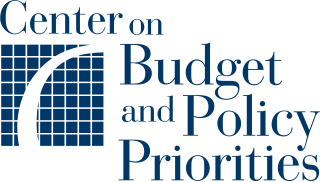
The Center on Budget and Policy Priorities (CBPP) is a progressive American think tank that analyzes the impact of federal and state government budget policies. A 501(c)(3) nonprofit organization,the Center's stated mission is to "conduct research and analysis to help shape public debates over proposed budget and tax policies and to help ensure that policymakers consider the needs of low-income families and individuals in these debates."

William G. "Bill" Gale is the Arjay and Frances Miller Chair in Federal Economic Policy and the former vice president and director of the Economic Studies Program at the Brookings Institution. He conducts research on a variety of economic issues,focusing particularly on tax policy,fiscal policy,pensions and saving behavior. He is also co-director of the Tax Policy Center,a joint venture of the Brookings Institution and the Urban Institute. Gale attended Duke University and the London School of Economics and received his Ph.D. from Stanford University in 1987.

The Urban-Brookings Tax Policy Center,typically shortened to the Tax Policy Center (TPC),is a nonpartisan think tank based in Washington D.C.,United States. A joint venture of the Urban Institute and the Brookings Institution,it aims to provide independent analyses of current and longer-term tax issues,and to communicate its analyses to the public and to policymakers. TPC combines national specialists in tax,expenditure,budget policy,and microsimulation modeling to concentrate on five overarching areas of tax policy:fair,simple and efficient taxation,social policy in the tax code,business tax reform,long-term implications of tax and budget choices,and state tax issues.
The Peter G. Peterson Foundation is an American billionaire-funded foundation established in 2008 by Peter G. Peterson,former US Secretary of Commerce in the Nixon Administration and co-founder of the Blackstone Group,an American financial-services company.

Tomas J. Philipson is a Swedish-born American economist who served as the Acting Chairman of the Council of Economic Advisers in the Trump administration. He departed from the position and the Council at the end of June,2020,to return to the University of Chicago. He holds the Daniel Levin Chair in Public Policy at the University of Chicago,with posts in the Harris School of Public Policy Studies,Department of Economics,and the Law School. He was a Director of the Becker Friedman Institute at the university.

Jason Furman is an American economist and professor at Harvard University's John F. Kennedy School of Government and a nonresident senior fellow at the Peterson Institute for International Economics. On June 10,2013,Furman was named by President Barack Obama as chair of the Council of Economic Advisers (CEA). Furman has also served as the deputy director of the U.S. National Economic Council,which followed his role as an advisor for the Barack Obama 2008 presidential campaign.
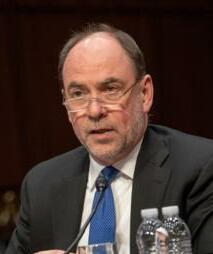
Douglas James "Doug" Holtz-Eakin is an American economist. He was formerly an economics professor at Syracuse University,director of the Congressional Budget Office,and chief economic policy adviser to Senator John McCain's 2008 presidential campaign. Holtz-Eakin is currently president of the American Action Forum policy institute,a conservative think tank.
The Committee for a Responsible Federal Budget (CRFB) is a non-profit public policy organization based in Washington,D.C. that addresses federal budget and fiscal issues. It was founded in 1981 by former United States Representatives Robert Giaimo (D-CT) and Henry Bellmon (R-OK),and its board of directors includes former Members of Congress and directors of the Office of Management and Budget,the Congressional Budget Office and the Federal Reserve.

Douglas William Elmendorf is an American economist who is the dean and Don K. Price Professor of Public Policy at the John F. Kennedy School of Government. He previously served as the Director of the Congressional Budget Office (CBO) from 2009 to 2015. He was a Brookings Institution senior fellow from 2007 to 2009,and briefly in 2015 following his time at the CBO,and was a director of the Hamilton Project at Brookings.

Maya MacGuineas is president of the Committee for a Responsible Federal Budget. She is a frequent commentator on issues such as the federal budget,national debt,taxes,the economy,retirement policy,government reform,and health care.
Leonard "Len" E. Burman is an American economist,tax policy expert,and author. He is currently an institute fellow at the Urban Institute,the Paul Volcker Chair in Behavioral Economics at the Maxwell School of Citizenship and Public Affairs at Syracuse University,and a senior research associate at Syracuse University's Center for Policy Research. He is,with Joel Slemrod,the author of Taxes in America:What Everyone Needs to Know. Burman is also a fellow of National Academy of Public Administration.
Steven Radelet is an American economist working within the field of International Development. He holds the Donald F. McHenry Chair in Global Human Development and is also the Director of the Global Human Development Program (GHDP) at Georgetown University,a program of the Edmund A. Walsh School of Foreign Service.

Benjamin H. Harris is an American economist who has served in several public-service positions,most notably as the chief economist and chief economic advisor to Vice President Joe Biden from 2014 until the end of the Obama administration. Harris was the executive director of the Kellogg Public-Private Interface at the Kellogg School of Management at Northwestern University,the Chief Economist to the evidence-based policy organization Results for America,and the founder of the economic policy consulting firm Cherrydale Strategies. He is also a frequent contributor to The Wall Street Journal. As of August 14,2023,he serves as the vice president of Economic Studies at the Brookings Institution.
References
- ↑ Padilla, Mariel (2019-12-08). "Donald B. Marron, Financier, Art Collector and Philanthropist, Dies at 85". The New York Times. ISSN 0362-4331 . Retrieved 2023-08-28.
- ↑ "UPDATE 1-Bush picks Marron for Council of Economic Advisers". Reuters. 2007-06-28. Retrieved 2023-08-28.
- ↑ Former Hill and White House Adviser Donald Marron To Direct Urban-Brookings Tax Policy Center, Urban Institute web site
- ↑ "Debt Reduction Task Force Members | Bipartisan Policy Center". Archived from the original on December 13, 2010. Retrieved March 29, 2011. "Debt Reduction Task Force Members"
- 1 2 "Donald Marron". Urban Institute. 2015-12-15. Retrieved 2023-08-28.
- ↑ "Donald Marron's Articles -- Seeking Alpha". 2009-09-11. Archived from the original on 2009-09-11. Retrieved 2023-09-06.
- ↑ "Biography of Donald B. Marron - Chairman of the Council of Economic Advisers". georgewbush-whitehouse.archives.gov. Retrieved 2023-09-06.